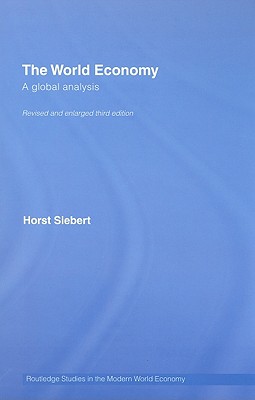

 Routledge
Routledge
Global View on the World Economy: A Global Analysis


Key Metrics
- Horst Siebert
- Routledge
- Hardcover
- 9780415402828
- 9.18 X 6.46 X 1.18 inches
- 1.79 pounds
- Business & Economics > International - Economics & Trade
- English
 Secure Transaction
Secure TransactionBook Description
As globalization continues apace, market segmentations are diminishing, distance is shrinking and the boundaries between nation states are becoming increasingly blurred. National economies are closely interlinked through manychannels and we rarely view things from a single country's view, adopting a global perspective instead. It is therefore imperative to understand how the world economy functions.
This book utilizes up to date empirical evidence to illuminate the mechanics of the world as a single entity. The author explores the properties of the world economy, the diverse mechanisms of interdependence, shocks and disturbances, economic processes and structures, and the institutional arrangements that guide these processes. Key topics covered include:
- world GDP, growth and global product and factor markets
- China as a new global player
- the roots and impact of financial and currency crises
- the performance of the developing countries over time (which have gained, which have lost?)
- conflicts between the national interest and global concerns (protectionism, locational competition for mobile factors of production, environmental issues)
- the institutional arrangements for the world economy (IMF, WTO).
The World Economy: A Global Analysis will be essential reading for students studying the world economy from the perspective of economics, finance, business and politics.
Author Bio
After studying in Cologne and at Wesleyan University in Connecticut, doctorate (1965) and habilitation (1969) in Münster, he was called to the Universities of Mannheim (1969) and Constance (1984). In 1989, Siebert moved to the Christian-Albrechts-University of Kiel and succeeded Herbert Giersch as President of the Kiel Institute. He was also a member of the German Council of Economic Experts for a large part of his term of office (1990 - 2003).
Siebert introduced environmental economic research at the Kiel Institute and focused on systemic ruptures in Germany and the world after 1989. He focused the Institute's research and consulting on institution-building in post-socialist societies, on the connections between monetary stabilization, real economic adjustment and institutional incentives, and international debt crises. Siebert was in great demand as a consultant in international bodies (EU, IMF, World Economic Forum). He made an impact on the public interested in economic policy through numerous publications and media appearances, in which he warned of undesirable developments on labor markets and the dangers of false incentives in the economy.
After his retirement, Siebert remained active in research and consulting and taught at the Bologna Center of the Paul H. Nitze School for Advanced Studies. Numerous textbooks, among others on foreign trade and environmental economics, established his reputation as an outstanding teacher.
Source: ifw-keil Institute for the World Economy
Videos
No Videos
Community reviews
Write a ReviewNo Community reviews